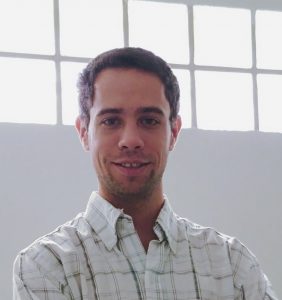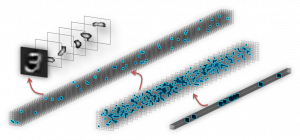Bio
“From Shallow and Local to Deep and Convolutional Sparse Modeling”
 Dr. Jeremias Sulam received his bioengineering degree from the Engineering Faculty of Universidad Nacional de Entre Rios, Argentina, in 2013. He is the recipient of the Best Graduates award of the Argentinean National Academy of Engineering. Jeremias has recently received his Ph.D. from the Computer Science Department of the Technion – Israel Institute of Technology, where he is now a post-doctoral fellow. His research interests include biomedical and general signal and image processing, sparse modeling and its application to inverse problems and machine learning.
Dr. Jeremias Sulam received his bioengineering degree from the Engineering Faculty of Universidad Nacional de Entre Rios, Argentina, in 2013. He is the recipient of the Best Graduates award of the Argentinean National Academy of Engineering. Jeremias has recently received his Ph.D. from the Computer Science Department of the Technion – Israel Institute of Technology, where he is now a post-doctoral fellow. His research interests include biomedical and general signal and image processing, sparse modeling and its application to inverse problems and machine learning.
 Click here to view webcast.
Click here to view webcast.
Abstract
“From Shallow and Local to Deep and Convolutional Sparse Modeling”
 Sparse approximation is a well established field, with a profound impact on signal and image processing. In this talk, after briefly describing the practical and theoretical limitations of traditional local approaches, I will focus on the Convolutional Sparse Coding (CSC) model, which has gained considerable attention in computer vision and machine learning. While several works have been devoted to the practical aspects of this model, a systematic theoretical understanding of it seems to have been left aside. I will present a novel analysis of the CSC problem based on the observation that, while being global, this model can be characterized and analyzed locally. By imposing only local sparsity conditions, we show that stability to noise perturbation and success of pursuit algorithms are globally guaranteed. I will then present a Multi-Layer extension of this model and show its close relation to Convolutional Neural Networks (CNNs). This perspective brings a fresh view to CNNs, as one can attribute to them theoretical claims under local sparse assumptions, shedding light on ways of improving the design and implementation of these networks. Last, but not least, we will derive a learning algorithm for this model and demonstrate its applicability in unsupervised settings.
Sparse approximation is a well established field, with a profound impact on signal and image processing. In this talk, after briefly describing the practical and theoretical limitations of traditional local approaches, I will focus on the Convolutional Sparse Coding (CSC) model, which has gained considerable attention in computer vision and machine learning. While several works have been devoted to the practical aspects of this model, a systematic theoretical understanding of it seems to have been left aside. I will present a novel analysis of the CSC problem based on the observation that, while being global, this model can be characterized and analyzed locally. By imposing only local sparsity conditions, we show that stability to noise perturbation and success of pursuit algorithms are globally guaranteed. I will then present a Multi-Layer extension of this model and show its close relation to Convolutional Neural Networks (CNNs). This perspective brings a fresh view to CNNs, as one can attribute to them theoretical claims under local sparse assumptions, shedding light on ways of improving the design and implementation of these networks. Last, but not least, we will derive a learning algorithm for this model and demonstrate its applicability in unsupervised settings.
 Click here to view webcast.
Click here to view webcast.